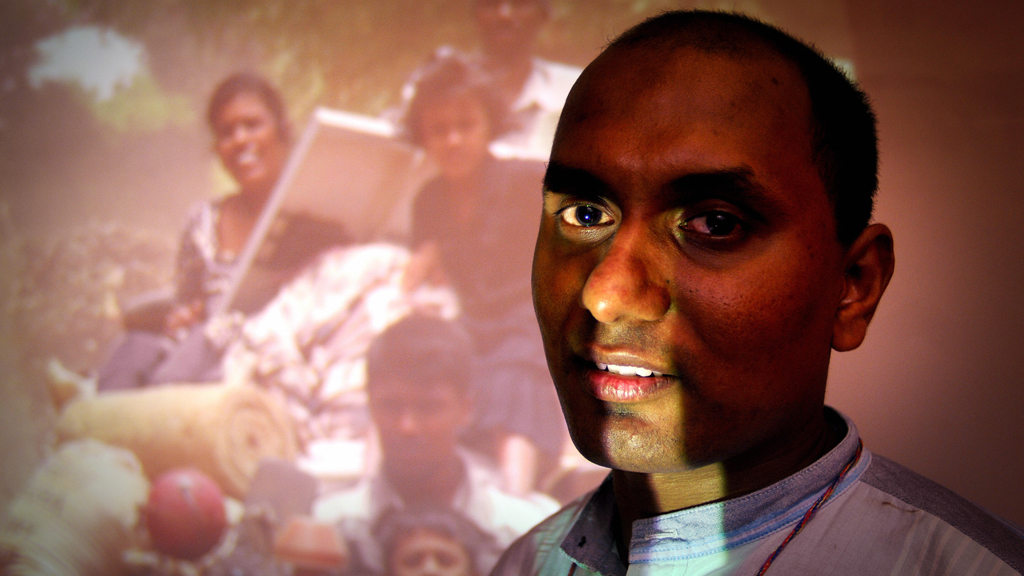Arrests of Sri Lankan activists condemned by Foreign Office
The arrest of two prominent human rights activists in Sri Lanka is condemned as “not acceptable” by British Foreign Office Minister Hugo Swire, writes Callum Macrae.

(Picture above: Ruki Fernando in 2009.)
Mr Swire said he was “deeply concerned” to hear of the arrests and urged the government of Sri Lanka to allow them “immediate access to lawyers and their families”.
He added that the two men – Father Praveen Mahesan, a priest and human rights defender, and Ruki Fernando a Catholic human rights activist from the majority Sinhala community – have “a strong record of promoting peace, justice and reconciliation across the country”.
The arrests follow the controversial detention last week of a leading Tamil campaigner for the disappeared, Balenderan Jayakumari, who was arrested along with her 13 year old daughter and is currently detained under the country’s prevention of terrorism act. That arrest too, was condemned by Mr Swire.
‘The world is watching’
”With the March UN Human Rights Council underway and a resolution on Sri Lanka under draft, these arrests underline why the Council must continue its focus on Sri Lanka. The world is watching what happens there, so I urge the Sri Lankan Government to respect human rights defenders and uphold the principles of free expression and movement.”
The two men were arrested yesterday in the Kilinochchi area and taken to the Sri Lankan capital Colombo for questioning by the Terrorism Investigation Department.
According to a statement from the Jaffna Catholic Diocesan Laity Council, they were looking into the circumstances of Mrs Jayakumari’s arrest when they themselves were seized.
The arrests come as Sri Lanka is under considerable international scrutiny at the United Nations Human Rights Council meeting currently under way in Geneva.
The council is due to vote on a resolution at the end of the month which is expected to propose some form of international investigation into allegations of war crimes and crimes against humanity committed by both sides during the final stages of the 26-year long civil war.
The resolution is also likely to call for an investigation of ongoing abuses of human rights in Sri Lanka. Intensive lobbying is going on behind the scenes by those opposed to the resolution and those who want to strengthen its wording.
‘Tainting activists’
The arrests were condemned today by a prominent Sri Lanka civil society commentator, Dr Paikiasothy Saravanamuttu of the Centre for Policy Alternatives.
He linked the arrests to the Geneva deliberations and said the government seemed to be determined to stop information emerging from the area about disappearances or human rights issues.
“They want to ensure that that flow of information is turned off. That is why they are going for people on the ground,” he said. “They are also trying to taint these human rights activists with association with the LTTE.”
Government sources have claimed that a wanted man who was involved in a shooting had been present at Mrs Jayakumari’s house, though this is strongly disputed by locals.
Read more from Callum Macrae: Sri Lanka - new video evidence of grotesque violations
Mrs Jayakumari is now being held under the government’s draconian Prevention of Terrorism act which provides, in practice, for indefinite detention. Her son disappeared after being taken captive by government forces at the end of the war.
He was 15 at the time and had apparently been conscripted as child soldier by the LTTE or Tamil Tigers.
The British government is likely to come under increasing pressure to take some action on the arrests, particularly as Mrs Jayakumari was one of those demonstrating in support of the disappeared when David Cameron visited Jaffna during the Commonwealth heads of government meeting last November.
Following the visit the UK Foreign and Commonwealth Office issued a statement saying: “We have emphasised to the Sri Lankan government that the human rights defenders, journalists and members of the public whom ministers met during CHOGM should not face any reprisals.
“Our high commission in Colombo is closely monitoring this situation post-CHOGM.”
Callum Macrae is a journalist and director of No Fire Zone. You can follow @Callum_Macrae on Twitter.
-
Latest news
-
‘I violated my moral compass working for Trump,’ former lawyer testifies3m

-
Working class creatives in film and TV at lowest level in decade5m

-
Israeli police investigating attack on Gaza aid convoy4m

-
Biden announces major tariff increase on Chinese-imported green tech3m

-
‘If NHS can afford it, people with obesity should have Semaglutide,’ says weight loss expert5m

-




